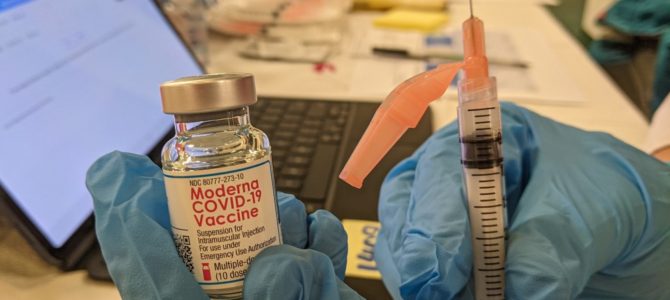
While 46 percent of white Americans have received at least one COVID vaccine shot by now, only 33 percent of black Americans have done the same, according to the federal data available as of June 21 and analyzed most recently by the Kaiser Family Foundation (KFF).
This means that, under the “disparate impact” standard now used to convict a workplace of racial discrimination under federal regulations and to accuse the United States of “systemic racism,” any use of vaccine status to reward or punish employees or citizens also comprises systemic racism. So, for example, using COVID vaccination status to determine who may get tickets to public events or requiring people to be vaccinated to keep their jobs will turn away larger percentages of black Americans than of white Americans.
“Overall, across these 40 states, the percent of White people who have received at least one COVID-19 vaccine dose (46%) was roughly 1.4 times higher than the rate for Black people (33%) and 1.2 times higher than the rate for Hispanic people (38%) as of June 21, 2021,” KFF reports. In some states, the racial imbalance was even higher.
“White people had a higher vaccination rate compared to Hispanic people in all reporting states, except Virginia, Vermont, and Missouri, and a higher rate than Black people in every reporting state, except Oregon, Alaska, and Idaho,” KFF notes.
In New York, 51 percent of white people and 35 percent of black people have gotten at least one COVID shot, making white people 1.5 times as able to get access to locations under the state’s vaccine passport system, Excelsior. The alternative to vaccination under Excelsior is constant COVID testing, which again would be disproportionately applied to black citizens.
On just about every poll, African Americans and Latino Americans have registered higher levels both of COVID caution and vaccine hesitancy than white and Asian Americans over the entirety of the virus outbreak. COVID vaccines have been widely available for free in regularly accessed locations like grocery stores and pharmacy chains for at least a month nationwide, meaning that disparate levels of COVID vaccination at this point are not entirely due to lack of access among blacks and Latinos, but a greater preference for not receiving the shot.
Disparate impact, also called “adverse impact,” is the legal theory that “Discrimination can result from neutral employment policies and practices which are applied evenhandedly to all employees and applicants, but which have the effect of disproportionately excluding women and/or minorities,” according to the Equal Employment Opportunity Commission (EEOC). In other words, this legal theory says that racism can be proven when a neutral policy applied equally to all results in greater effects on non-white people. That’s exactly the outcome in the case of vaccine passports or requiring COVID vaccination for employment or college enrollment when approximately one-half as many black Americans are vaccinated as white Americans.
Despite the legal and social implications of effectively banning higher percentages of black people from their premises, many major employers, especially universities, have demanded COVID vaccination as a condition of employment or university enrollment. Many large hospital and other health-care employers have also mandated COVID vaccines for employees.
The latest numbers show white unemployment at 5.1 percent, black unemployment at 9.1 percent, and Latino unemployment at 7.3 percent.
Approximately 450 colleges and universities so far have announced they will require students to be vaccinated to enroll this summer or fall. At many campuses, such as Indiana University and the University of Notre Dame, students are filing lawsuits in response.
Many governors and counties have also relaxed mask mandates and social distancing rules for the vaccinated, including Colorado, Kentucky, Michigan, Pennsylvania, Washington, and Wisconsin. This happened after the U.S. Centers for Disease Control issued guidance affirming that those vaccinated don’t need to wear masks indoors.
Under “disparate impact” rules used by federal agencies such as the EEOC, however, this will have clearly discriminatory effects. Such rules would have the effect of banning higher percentages of black people from places based on their medical history. Or if unvaccinated employees are, say, still required to wear masks at work while the vaccinated can lose the masks, disproportionately more black employees will then be forced to publicly disclose their private medical decision by continuing to wear masks.
Despite racial implications like these, the EEOC recently issued guidance saying employers can mandate COVID vaccines as a condition of employment. The guidance, however, seems as clear as mud, also telling employers that while they can mandate vaccines they can’t do so in a way that would produce disparate racial impacts or violate other regulations such as those protecting medical privacy — which means they can’t actually mandate vaccines for employees. This is probably why lawyers told news outlets the EEOC guidance is a lawsuit bonanza.









